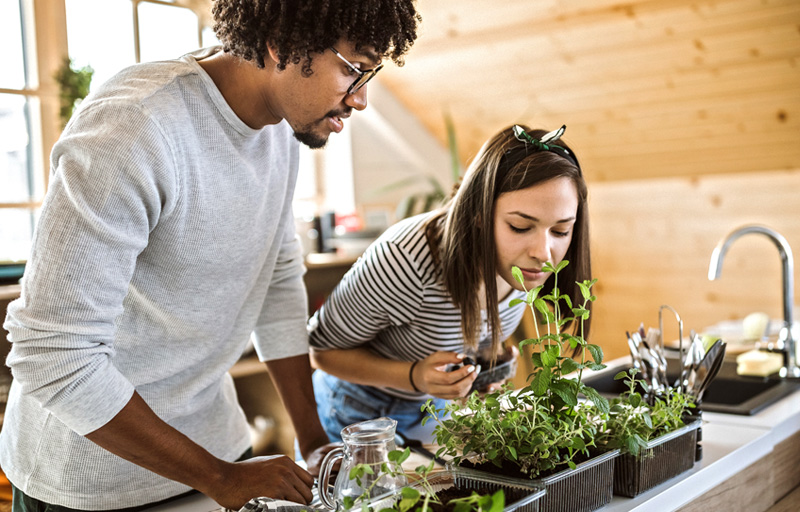For decades we’ve been hearing the mantra “reduce, reuse and recycle”. Doing so has become a habit for many of us, and while every little bit helps, there are always things we could be doing to live a more eco-friendly lifestyle.
Living an eco-friendly lifestyle is all about making decisions — big and small — with environmental impacts in mind. In fact, the term eco-friendly actually means “friend of the earth”. Just like how we want to treat our friends well, we want to treat our earth well too.
If you’re looking for ways to live a more eco-friendly lifestyle at home, that doesn’t mean you have to run out and buy all new appliances or other big-ticket items. By incorporating some changes where you can, you can still have a positive impact on the environment.
Here are five ways to adopt a more eco-friendly lifestyle at home.
#1. Embrace Greenery
Air quality is one of the biggest issues facing our planet, and the air we breathe can have a big impact on our overall health and wellness. That’s why when looking to adopt an eco-friendly lifestyle, houseplants are an absolute must-have.
Not only do houseplants help reduce pollutants and gases from the air, but they also have many other benefits like reducing stress, improving sleep and helping boost our immunity systems.
When choosing houseplants, consider what each selection can contribute to your home environment. While each plant will help with overall air quality, each one has other properties that may be helpful to your home.
Some plants to consider include:
- Rubber Plant
- Peace Lily
- English Ivy
- Aloe Vera
- Boston Fern
- Snack Plant
- Spider Plant
#2. Take it to the Kitchen
Kitchens tend to the hub of the home, so this is a natural place to focus when adopting a more eco-friendly lifestyle.
Food waste is something that can have a big impact on the environment, so consider incorporating weekly meal planning and food prep to reduce waste.
For any food waste you do generate, composting is a great way to make any of your output useful. Not only does it not end up in a landfill, but the composted waste makes an amazing fertilizer for your garden.
Other small changes you can make in your kitchen that supports a more eco-friendly lifestyle include:
- Growing herbs, fruits, and vegetables.
- Buy from local farms and food vendors.
- Buy dried goods from bulk good stores to reduce packaging waste.
- Cut back on processed food.
- Lower your meat consumption.
- Avoid BPA-lined containers.
- Stop using disposable coffee pods.
- Use reusable cloths instead of paper towels or sponges.
- Use cutting boards made from sustainable materials.
#3. Go Green With Cleaning
Using eco-friendly cleaning products can have many benefits for both the environment and the people living in your home.
Cleaning products considered eco-friendly can improve overall air quality, which can help to reduce certain health risks. Also, these products have to meet specific guidelines to ensure they are non-corrosive and non-toxic in addition to ensuring they have minimal skin absorption.
The eco-friendly cleaning products you can purchase generally have sustainable packaging, in addition to being biodegradable and non-toxic. However, you don’t actually need to buy special products if you want to be green with your cleaning — you can easily make your own mixtures using common household ingredients.
Ingredients that are effective for cleaning can include:
- Baking soda
- Vinegar
- Tea tree oil
- Hydrogen peroxide
- Borax
- Castille soap
- Essential oils
If you’re looking to mix your own cleaners in support of an eco-friendly lifestyle, you can start with this common recipe for all-purpose cleaner:
Combine 8 cups of water, ¼ cup of baking soda and ½ cup of vinegar.
#4. Light It Up With LEDs
Now, you may be thinking that changing your light bulbs doesn’t sound particularly important when adopting an eco-friendly lifestyle, but there are actually several benefits of moving to LEDs.
Not only are LED light bulbs incredibly energy efficient, they also have a long life span. Less frequent replacement means less waste ending up in a landfill. LEDs are less likely to break and can withstand more vibrations and impact than a standard light bulb.
LED bulbs also offered improved environmental performance as they don’t throw any heat or create UV emissions. They operate extremely well in cold weather and only require a low voltage to function.
Another benefit of switching to LEDs is that they can also increase the lifespan of your fixtures. Lights that are constantly turned on and off (also referred to as rapid cycling) tend to wear out more quickly with traditional lightbulbs. Rapid cycling has no impact on LEDs, which makes them an ideal choice.
#5. Dress Your Windows
While you may think that window coverings like drapes or blinds are simply about ensuring your privacy and adding some style, they actually can serve a greater purpose.
Windows are one of the primary areas in a home that can create a loss of heat (or cooling). By choosing curtains or blinds that offer a thermal layer, you can help keep the temperature in your home more consistent — saving energy AND money.
Create an Eco-Friendly Lifestyle With Small Changes
Adopting an eco-friendly lifestyle isn’t something that needs to happen overnight. Choosing to make small, incremental changes — combined with larger changes when the time is right — will have an impact.
By each of doing our part, we can contribute to creating a better environment for ourselves, along with a healthier planet for everyone.
Westcott Homes offers modern living and smart design for today’s active families, in neighborhoods with room to grow. Our flexible floorplans, durable Pacific Northwest exteriors and luxurious interior details add up to a home you’ll delight in every day, and for years to come.







